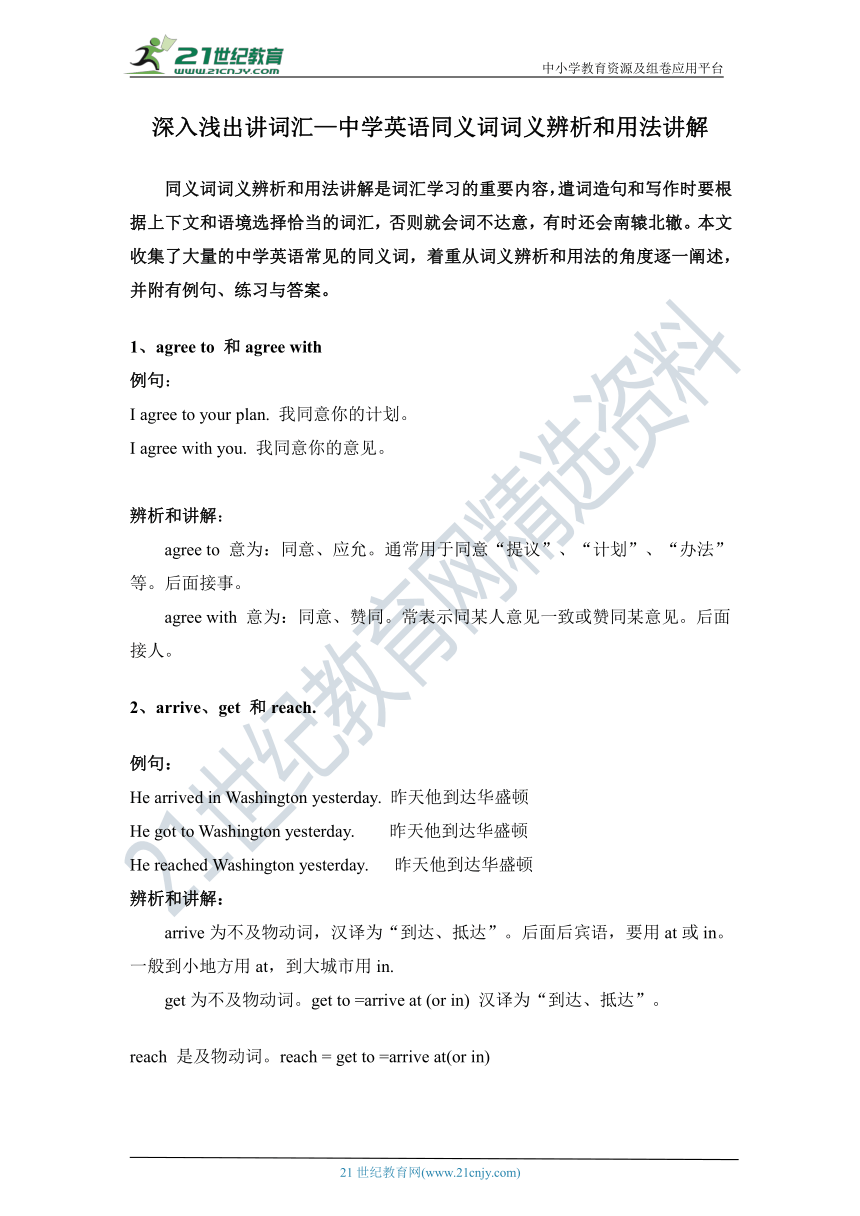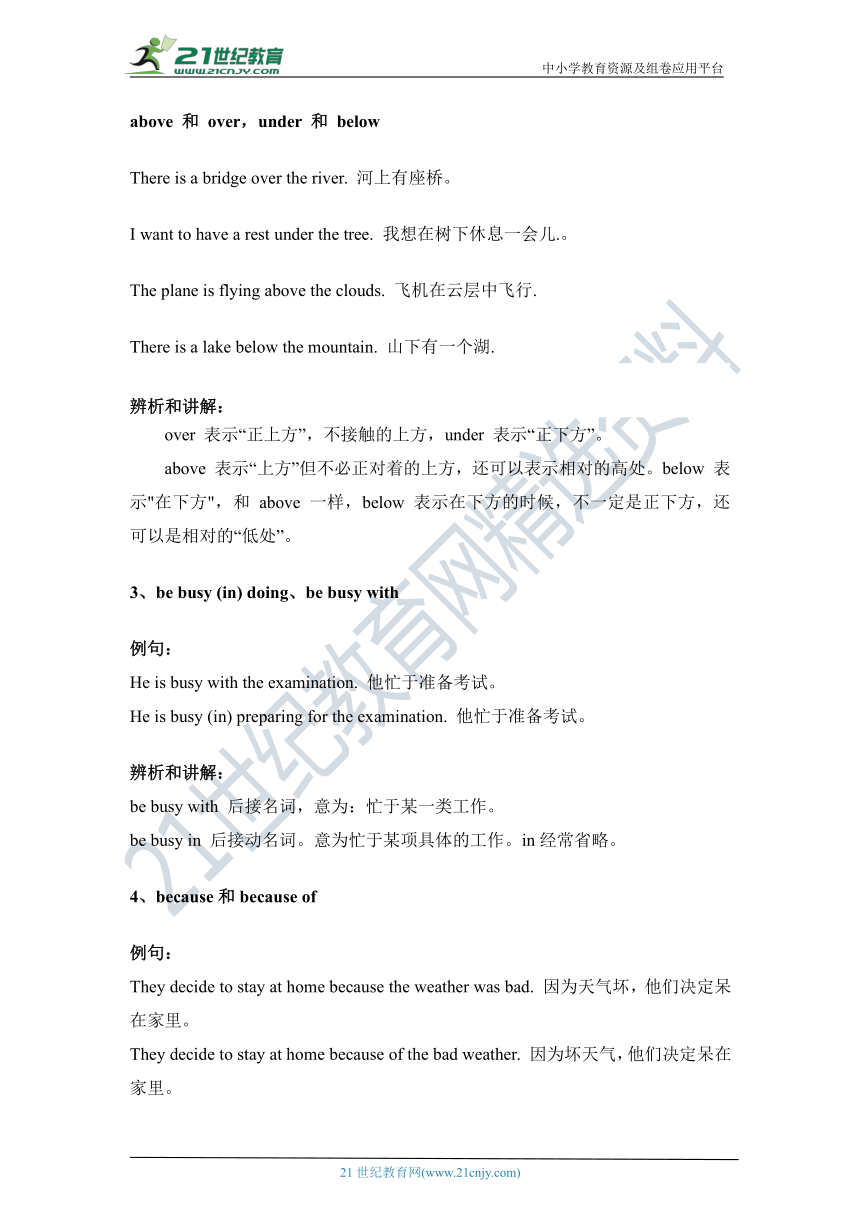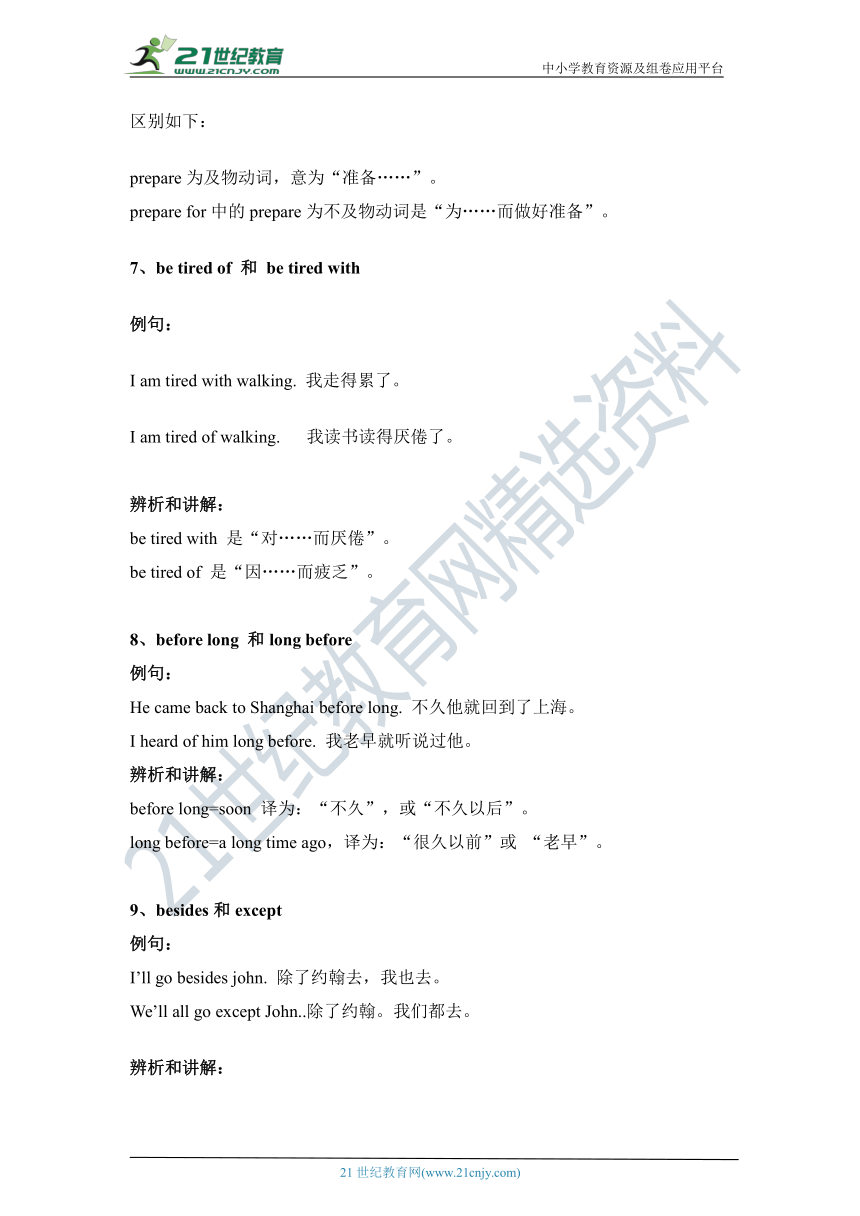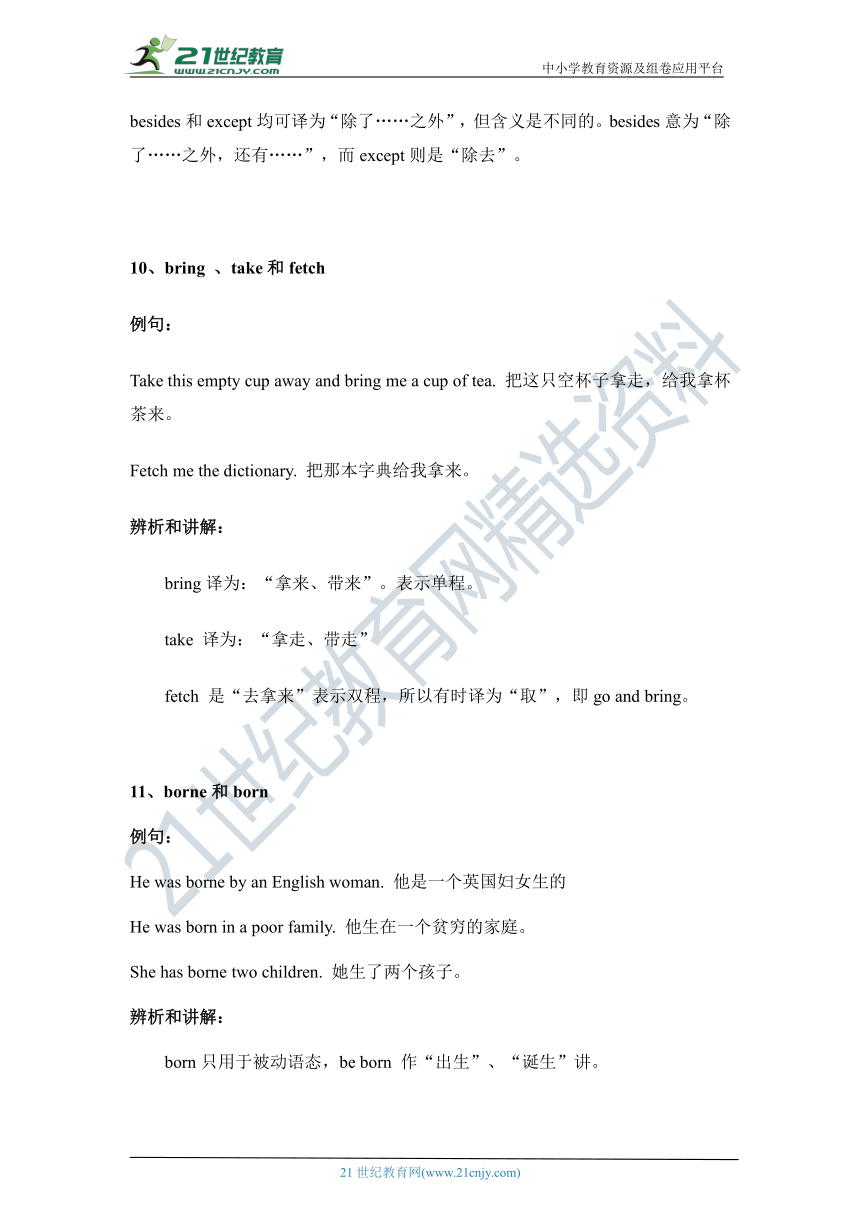深入浅出讲词汇—中考英语同义词词义辨析和用法讲解 (知识梳理+练习)
文档属性
| 名称 | 深入浅出讲词汇—中考英语同义词词义辨析和用法讲解 (知识梳理+练习) |  | |
| 格式 | zip | ||
| 文件大小 | 1.2MB | ||
| 资源类型 | 试卷 | ||
| 版本资源 | 通用版 | ||
| 科目 | 英语 | ||
| 更新时间 | 2019-06-04 10:36:15 | ||
图片预览





文档简介
中小学教育资源及组卷应用平台
深入浅出讲词汇—中学英语同义词词义辨析和用法讲解
同义词词义辨析和用法讲解是词汇学习的重要内容,遣词造句和写作时要根据上下文和语境选择恰当的词汇,否则就会词不达意,有时还会南辕北辙。本文收集了大量的中学英语常见的同义词,着重从词义辨析和用法的角度逐一阐述,并附有例句、练习与答案。
1、agree to 和agree with
例句:
I agree to your plan. 我同意你的计划。
I agree with you. 我同意你的意见。
辨析和讲解:
agree to 意为:同意、应允。通常用于同意“提议”、“计划”、“办法”等。后面接事。
agree with 意为:同意、赞同。常表示同某人意见一致或赞同某意见。后面接人。
2、arrive、get 和reach.
例句:
He arrived in Washington yesterday. 昨天他到达华盛顿
He got to Washington yesterday. 昨天他到达华盛顿
He reached Washington yesterday. 昨天他到达华盛顿
辨析和讲解:
arrive为不及物动词,汉译为“到达、抵达”。后面后宾语,要用at或in。一般到小地方用at,到大城市用in.
get为不及物动词。get to =arrive at (or in) 汉译为“到达、抵达”。
reach 是及物动词。reach = get to =arrive at(or in)
above 和 over,under 和 below
There is a bridge over the river. 河上有座桥。
I want to have a rest under the tree. 我想在树下休息一会儿.。
The plane is flying above the clouds. 飞机在云层中飞行.
There is a lake below the mountain. 山下有一个湖.
辨析和讲解:
over 表示“正上方”,不接触的上方,under 表示“正下方”。
above 表示“上方”但不必正对着的上方,还可以表示相对的高处。below 表示"在下方",和 above 一样,below 表示在下方的时候,不一定是正下方,还可以是相对的“低处”。
3、be busy (in) doing、be busy with
例句:
He is busy with the examination. 他忙于准备考试。
He is busy (in) preparing for the examination. 他忙于准备考试。
辨析和讲解:
be busy with 后接名词,意为:忙于某一类工作。
be busy in 后接动名词。意为忙于某项具体的工作。in经常省略。
4、because和because of
例句:
They decide to stay at home because the weather was bad. 因为天气坏,他们决定呆在家里。
They decide to stay at home because of the bad weather. 因为坏天气,他们决定呆在家里。
辨析和讲解:
because为连接词,后面需接从句。
because of为介词,后面需接名词或名词性质的词,如动名词。
5、because,since和as
例句:
He is absent because he is ill. 或 because he is ill,he is absent.她缺席,因为生病了。
Since you insist,I must go. 因为你坚持,我就必须去。
As I am ill, I won’t go. 因为我有病,我将不去了。
辨析和讲解:
1.because语气最强,回答why,一般译为“因为”。由because引导的原因状语从句可放在主句前,也可放在主句后。放在主句前,中间要用逗号。
Since 引导的原因状语从句语气稍弱,一般译为“既然”。as引导的原因状语从句语气更弱,一般译为“由于”。
2.汉语中常说:“因为……所以”,而在英语中because、since和as均不可与so连用。
6、be (get)ready,prepare和prepare for
例句:
We were(got)ready. to start.我们准备好了出发。
I didn’t prepare today’s lesson. 我没有准备今天的课。
He prepared for the journey. 他准备旅行。
辨析和讲解:
be (get)ready强调准备就绪,表示结果。ready是形容词。
prepare和prepare for均为:“准备”,表示动作和工程。
区别如下:
prepare为及物动词,意为“准备……”。
prepare for中的prepare为不及物动词是“为……而做好准备”。
7、be tired of 和 be tired with
例句:
I am tired with walking. 我走得累了。
I am tired of walking. 我读书读得厌倦了。
辨析和讲解:
be tired with 是“对……而厌倦”。
be tired of 是“因……而疲乏”。
8、before long 和long before
例句:
He came back to Shanghai before long. 不久他就回到了上海。
I heard of him long before. 我老早就听说过他。
辨析和讲解:
before long=soon 译为:“不久”,或“不久以后”。
long before=a long time ago,译为:“很久以前”或 “老早”。
9、besides和except
例句:
I’ll go besides john. 除了约翰去,我也去。
We’ll all go except John..除了约翰。我们都去。
辨析和讲解:
besides和except均可译为“除了……之外”,但含义是不同的。besides意为“除了……之外,还有……”,而except则是“除去”。
10、bring 、take和fetch
例句:
Take this empty cup away and bring me a cup of tea. 把这只空杯子拿走,给我拿杯茶来。
Fetch me the dictionary. 把那本字典给我拿来。
辨析和讲解:
bring译为:“拿来、带来”。表示单程。
take 译为:“拿走、带走”
fetch 是“去拿来”表示双程,所以有时译为“取”,即go and bring。
11、borne和born
例句:
He was borne by an English woman. 他是一个英国妇女生的
He was born in a poor family. 他生在一个贫穷的家庭。
She has borne two children. 她生了两个孩子。
辨析和讲解:
born只用于被动语态,be born 作“出生”、“诞生”讲。
borne可用于完成时态 或被动语态,意为“生育”、“生”。
12、cost、spend和take
例句:
The shirt cost me two dollars. 这件衬衫花了我两块钱。
The invention cost me much time. 这项发明花了我很多时间
He spent a lot of money on books every year. 每年他花很多钱买书。
He spent two hours (in) finishing the work. 他用了两个小时做完了这项工作。
He took two hours to finish the work.. 他用了两个小时做完了这项工作。
It took him two hours to finish the work. 他用了两个小时做完了这项工作。
辨析和讲解:
Cost的主语一般是人,只可说:It cost me much money. 切不可说:It cost much money to me.也不可变为被动语态,如:I was cost much money.
Spend的主语必须是“人”,宾语是“时间”或“金钱”。要用on 接名词或用in(通常省略)接-ing的形式。
take的主语是人,也可用it做它的形式主语,后面经常接双宾语。
13、first和at first
例句:
First, you must finish the work..或You must finish the work., First, 你必须先完成这项工作。
There were no schools here at first. 起初,这里没有学校。
辨析和讲解:
first是“第一、最先、首先”的意思。同时也有“初次”(即for the first time)的意思。
at first是at the beginning的意思,即“最初”、 “当初”。
find和look for
例句:
I’m looking for my watch, but can’t find it. 我在找我的手表,但是找不到。
I found a wallet in the desk. 我在课桌里发现了一个钱包。
辨析和讲解:
find和 look for 都有“找”的意思,但含义不同;find译为 “找到”、“发现”,look for 译为“找”、“寻找”。find 强调“找”的结果,而look for 强调“找”的过程。
14、go on doing和go on to do
例句:
Let’s go on reading Lesson Ten. 咱们继续读第十课。
Let’s go on to read Lesson Ten. 咱们接着读第十课。
辨析和讲解:
go on doing表示某事尚未做完,继续做下去,即继续做原来的事。译为:“继续……”。
go on to do 表示某事已做完,接着做另一件的事。译为:“接着……;进而……”。
go on with 后面接名词。也是“继续……”。
15、go to bed,go to sleep和sleep.
例句:
It’s ten o’clock; it’s time for us to go to bed. 十点钟了,我们该睡觉了。
I didn’t go to sleep until five in the morning. 我知道早晨五点钟才入睡。
I sleep eight hours last night. 昨夜我睡了八个小时。
辨析和讲解:
这几个词在英语中均可说成“睡觉”,实际意义是不同的。
go to bed指动作,意为“就寝”,“上床睡觉”。
go to sleep指“入睡”、“进入梦乡”,同义词有be(或fall)asleep。
Sleep 通常作“睡眠”讲,指“睡眠状态”。
16、hard和hardly
例句:
We are studying English hard. 我们在努力学习英语。
I can hardly believe it. 我几乎不能相信。
辨析和讲解:
hard 做副词时,译为 “努力”。
hardly 是副词,是“几乎不”的意思。本身就含有否定意味。
17、have gone to 和have been to
例句:
He isn’t here, he has gone to Shanghai.他不在这儿,已经去上海了。
I have been to Shanghai twice 我去过上海两次。(我已经回来了,不在上海。)
辨析和讲解:
have gone to 表示 “去了”,“尚未回来”之意,主语一般是第三人称。
have been to 表示 “到过”、“去过”(某地),或“刚去做过某事,已经回来”。
18、have to 和must
例句:
I have to go now. 现在我得走了。
You must work hard at your lessons. 你必须在学习上下功夫。
辨析和讲解:
have to 表示 “必须”,在这个意义上与must很接近。但:
have to表示客观的需求,意为 “不得不”,另外有更多的时态形式。
must表示说话人的主观看法,译为“必须”。
19、hear和listen,see和look
例句:
I listened, but heard nothing. 我听啦,但什么也听不见。
I looked, but saw nothing. 我看过,却什么也看不见。
辨析和讲解:
listen 是不及物动词,为有意识的动作,表示用耳朵注意地听。
hear是及物动词,意思是“听见”,“听到”,表示用耳朵听到了。
look一般为不及物动词,是有意识的动作,表示用眼睛看。
see是及物动词,意思是“看到”、 “看见”,表示用眼睛看到了。
hear of 和 hear from
例句:
I have heard of him, but never seen him. 我听说过他,但从未见过他。
Let me hear from you soon. 希望你早日给我写信。
辨析和讲解:
hear of 后接名词、动名词, 表示间接地听到,译为“听说”、“听到”。如果后面接从句就不要of了。由that引导从句。
hear from 是“接到来信”、“收到来信”的意思。
hung和 hanged
例句:
I hung a map of China on the wall. 我把一副中国地图挂在了墙上。
He was hanged in the morning. 他早晨被处决了。
辨析和讲解:
动词hang 的过去式和过去分词有两种形式。过去式和过去分词为hung时,译为“挂”、“悬挂”;而过去式和过去分词为hanged时,译为“把……绞死”。
If和 whether
例句:
I wonder if it is large enough. 我不知道它是否足够大。
I wonder whether it is large enough. 我不知道它是否足够大。
Whether we shall go or not has not been decided. 我们去还是不去还没定下来。
She hasn’t decided whether to go or not. 她是否去还没有决定。
辨析和讲解:
1. whether和if都可引导名词从句作宾语从句。表示疑问,译为“是否”。为了强调,whether……or not是常用的。if ……or not一般用于口语,尤其是美式英语。另:要特别注意从句用陈述句语序。
2. whether可引导名词性从句作主语从句,而if 不能。
in和 after
He will arrive in an hour. 他一个小时后到。
He arrived after an hour. 他在一个小时后到了。
He will arrive after four o’clock. 他四点以后到。
辨析和讲解:
in指“在……之后”,以现在为起点,一般用于将来时。After指“在……之后”,以过去为起点,一般用于过去式。但说具体事件或时间之后,尽可用after.
In和on
例句:
The book was published in 1990. 这本书是1990年出版的。
The book was published in May, 1990. 这本书是1990年5月出版的。
.The book was published on May, the tenth, 1990.. 这本书是1990年5月10日出版的。
The book was published on Monday. 这本书是星期一出版的。
辨析和讲解:
在年、月前用介词in,在星期、日期或某早晨和晚上用介词on。
in front of 和in the front of
例句:
There is a car in front of the house. 房子前面有一辆小汽车。
The teacher stands in the front of the classroom. 老师站在教室的前部。
辨析和讲解:
in front of=before 是“在……前面”的意思。指在某个地方之外。in the front of
是“在……前部”。指一个范围之内的前部。
lay 和lie
例句:
The postman lays the newspaper on the table every day. 每天,邮递员把报纸放在桌子上。
The postman laid the newspaper on the table yesterday. 昨天,邮递员把报纸放在桌子上。.
He lies on the sofa to rest every day after work.. 每天下班后他躺在沙发上休息。
He lay on the sofa to rest yesterday after work.. 昨天下班后他躺在沙发上休息。
辨析和讲解:
lay是及物动词,过去式和过去分词都是laid, 它是及物动词. 译为“放”、“搁”。
lie是不及物动词,过去式是lay, 过去分词是lain。现在分词是lying。译为 “躺”、“卧”。这两个词相近,容易产生混淆。
like和the same as
例句:
The coat is like that one. 这件衬衫和那件衬衫一样。
The coat is the same as that one. 这件衬衫和那件衬衫一样。.
辨析和讲解:
注意此处的like是介词,译为 “像……”,as 是关系代词。like 不可换为as。短语the same as 中的as不可换为to或like,也不可以说as same as,而应把第一个as改成the.
make……of和make……from
例句:
This bridge is made of stone. 这座桥是石头造的。
Wine is made from grapes. 这酒是葡萄酿的。.
辨析和讲解:
make……of和make……from均为 “用……制造”。凡不改变本质的用make……of,改变本质的用make……from。例句中石头造成桥后,其本质不变。葡萄酿成酒后,其本质改变了。
raise和rise
例句:
Heavy rain raises the water level of the river every spring. 每年春天暴雨使河水的水位升高。
The water level of the river rises when it rains every spring.。.每年春天一下雨,河水水位就升高。
辨析和讲解:
raise是及物动词,后面不需要接宾语。译为“举起,使……升高”。
rise是不及物动词,后面不需要接宾语。译为“上升” 。
receive和accept
例句:
He received the present, but didn’t accept it. 他收到了礼物,但并不接受。
辨析和讲解:
receive和accept都是 “收”或“接”的意思,但用法是不同的。receive是 “收到”、 “接到”,指动作和事实;accept是“接受”,表示结果。
some time, sometime和sometimes
例句:
He stayed here for some time. 他在这儿住过一段时间。
I’ll go to Shanghai sometime next year.
sometimes I go to bed at twelve.
辨析和讲解:
some time作名词词组,表示 “一段时间”。
sometime用于过去时是表示 “曾今” 、“某个时候”的意思。用于将来时是表示“总有一日”、“某日”的意思。
sometimes是副词,表示“有时”的意思。
the same ……as和as……as
例句:
She is the same age as John. 她和琼年龄一样大。
She is as old as John.. 她和琼年龄一样大。
辨析和讲解:
the same ……as意为:和……一样。不可用to、like或with代替as. the same后一般接表特征的名词。
as……as意为:和……一样,同级比较,中间接表特征形容词或副词。
though和although
例句:
Though he did his best,he didn’t finish it on time. 虽然他很努力,但没有按时完成。
Although he did his best,he didn’t finish it on time. 虽然他很努力,但没有按时完成。
辨析和讲解:
1、Although和though意思相同,可以互换,但although ……as意为:和……一样。不可用to、like或with代替as. the same后一般接表特征的名词。
2、汉语中常说:“虽然……但是……”,而在英语中Although和though切不可与but连用。
too和either
例句:
He like English, I like it, too. 他喜欢英语,我也喜欢。
He doesn’t like skating, I don’t either. 他不喜欢滑冰,我也不喜欢滑冰。
辨析和讲解:
1、too和either均为副词,是“也”的意思。
2、too用于肯定句,一般放在句末,作为插入语也可放在句中。
either只能用在否定句中,必须放在句末。
used to和get(be)used to
例句:
He used to live in the country. 他过去住在乡下。
He was used to living in the country. 他习惯在乡下住。
辨析和讲解:
1、used to是过去常常……,be (get)used to是习惯于……。
2、used to中的used是动词,be used to中的used是形容词。
3、used to中的to是动词不定式,后接动词原形,be used to中的to是介词,后接动名词。
4、used to仅有过去形式,表达过去习惯性的动作。be used to可用于过去、现在和将来等。
5、used to没有其他形式可以替代,be used to的be可用get来替代。
worth和worthy
例句:
The book is worth reading. 这本书值得读。
The book is worthy of reading. 这本书值得读。
The book is worthy to be read. 这本书值得读。
辨析和讲解:
worth和worthy都是形容词,都是做“值得……”讲。但用法和搭配关系不相同。
worth后接动名词,它是主动形式,被动意义。
worthy后接of,接被动的动名词,或接被动的不定式。
练习:改正下列句子中的错误
1. They couldn’t agree to one another.
2. Do you agree with the arrangement?
3. Excuse me, can you tell me how I can get the railway station?
4. They arrived the school about ten minutes late.
5. He was busy for homework.
6. The bees are busy to collect honey.
7. She was absent because of her cold was worse.
8. John’s family is very happy because his being awarded a scholarship.
9. Since he is very busy, so I won’t trouble him.
10. She was preparing for the new lesson with other teacher.
11. I have to prepare tomorrow’s examination.
12. We’ll have a math exam next week; I have to ready it.
13. When he became tired with riding he started to walk.
14. he had five children and never tired to tell me about them.
15. I’m tired of fruit-picking.
16. Long before he had to move on.
17. The book will be printed long before.
18. The Swede stood quite still, besides that his lips moved slightly.
19. Two other boys were on duty except Tom.
20. She has born two children.
21. When was he borne?
22. Next time you come, take your sister.
23. Bring this spade to her, please.
24. We had to take water from a stream far away.
25. It took more than 100,000 slaves twenty years building the Great Pyramid.
26. It cost four hundred francs to us.
27. I’m spending a lot more time in English than before.
28. The girl was shy first.
29. You go at first and I’ll follow.
30. He made up his mind to go on to work at the wireless picture.
31. Please go on your story.
32. We sleep at nine.
33. Then he made a fire, ate something and lay down to go to bed.
34. As he was very tired, he slept as soon as he sat down.
35. Mum and Dad can not hardly write their names.
36. it is raining hardly.
37. He thought hardly, and had an idea.
38. Where have you gone, I’ve gone to the post-office.
39. She’s been to the shop, she’ll be back soon.
40. The work has to be finished as soon as possible.
41. My family was poor; I must go to work when I was your age.
42. You have to be back by ten.
43. Let’s see the handwriting.
44. We listen with our ears, we look with our eyes.
45. I listened to someone laugh.
46. The old man saw me from head to foot.
47. You’ll be hung as a spy tomorrow at sunshine.
48. The room is hanged with picture.
49. If she’s coming or not doesn’t matter too much.
50. I don’t remember whether I read the book before.
51. In four years the war was won by the North.
52. I think he’ll be back after an hour.
53. I have no classes in Saturday.
54. This letter was written in the morning of June, 7, 1905.
55. In the front of the blackboard there is a big desk.
56. He is sitting in front of the class room.
57. Sometimes he would lay down to let six of them dance on his hand.
58. He is laying on a bed.
59. I would like to see a suit as the one in the window.
60. My briefcase is exactly the same to yours.
61. The weather feels as the spring.
62. Is your book as same as mine.
63. We make boxes from paper.
64. We make paper of rags.
65. The sun had raised when we got to the top of the mountain.
66. We must rise the living standard of the people.
67. He accepted an invitation from the US, and received.
68. Yesterday, I accepted a letter from my younger brother.
69. I hope you’ll come sometimes in autumn.
70. I received a letter from him sometime ago.
71. He is sometime well, sometime unwell.
72. Her hair’s the same color with her mother’s.
73. Is it the same lecture like tomorrows?
74. Miss June’s English is not as clear like DR.Baker’s.
75. But he didn’t speak at the meeting though he said would.
76. Though he worked hard from morning till night, but he still couldn’t support his family.
77. You can do it either.
78. Haven’t you seen it, too?
79. I was used to work sometimes for the family that lived here.
80. I used to seeing him very often, but not now.
81. His teacher said that he was not bright and was not worth being taught.
82. Knowledge is worth to be worked for.
83. It’s worthy to remember.
练习答案:
1. They couldn’t agree with one another.
2. Do you agree to the arrangement?
3. Excuse me, can you tell me how I can get to the railway station?
4. They arrived at the school about ten minutes late.
5. He was busy with homework.
6. The bees are busy (in) collecting honey.
7. She was absent because her cold was worse.
8. John’s family is very happy because of his being awarded a scholarship.
9. Since he is very busy, I won’t trouble him.
10. She was preparing the new lesson with other teacher.
11. I have to prepare for tomorrow’s examination.
12. We’ll have a math exam next week, I have to prepare for it.
13. When he became tired of riding he started to walk.
14. He had five children and never tired of telling me about them.
15. I’m tired with fruit-picking.
16. Before long he had to move on.
17. The book will be printed before long.
18. The Swede stood quite still, except that his lips moved slightly.
19. Two other boys were on duty besides Tom.
20. She has borne two children.
21. When was he born?
22. Next time you come, bring your sister.
23. Take this spade to her, please.
24. We had to fetch water from a stream far away.
25. It took more than 100,000 slaves twenty years to build the Great Pyramid.
26. It cost us four hundred francs
27. I’m spending a lot more time on English than before.
28. The girl was shy at first.
29. You go first and I’ll follow.
30. He made up his mind to go on working at the wireless picture.
31. Please go on with your story.
32. We go to bed at nine.
33. Then he made a fire, ate something and lay down to sleep.
34. As he was very tired, he went to sleep as soon as he sat down.
35. Mum and Dad can hardly write their names.
36. it is raining hard.
37. He thought hard, and had an idea.
38. Where have you been, I’ve gone to the post-office.
39. She’s gone to the shop, she’ll be back soon.
40. The work must be finished as soon as possible.
41. My family was poor; I have to go to work when I was your age.
42. You must be back by ten.
43. Let’s look at the handwriting.
44. We hear with our ears, we see with our eyes.
45. I heard someone laugh.
46. The old man looked at me from head to foot.
47. You’ll be hanged as a spy tomorrow at sunshine.
48. The room is hung with picture.
49. Whether she’s coming or not doesn’t matter too much.
50. I don’t remember if I have read the book before.
51. After four years the war was won by the North.
52. I think he’ll be back in an hour.
53. I have no classes on Saturday.
54. This letter was written on the morning of June, 7, 1905.
55. In front of the blackboard there is a big desk.
56. He is sitting in the front of the class room.
57. Sometimes he would lie down to let six of them dance on his hand.
58. He is lying on a bed.
59. I would like to see a suit like the one in the window.
60. My briefcase is exactly the same as yours.
61. The weather feels like the spring.
62. Is your book the same as mine.
63. We make boxes of paper.
64. We make paper from rags.
65. The sun had risen when we got to the top of the mountain.
66. We must raise the living standard of the people.
67. He received an invitation from the US, and. accepted
68. Yesterday, I received a letter from my younger brother.
69. I hope you’ll come sometime in autumn.
70. I received a letter from him some time ago.
71. He is sometimes well, sometimes unwell.
72. Her hair’s the same color as her mother’s.
73. Is it the same lecture as tomorrows?
74. Miss June’s English is not as clear as DR.Baker’s.
75. He didn’t speak at the meeting though he said would.
76. Though he worked hard from morning till night, he still couldn’t support his family.
77. You can do it , too.
78. Haven’t you seen it, either?
79. I used to work sometimes for the family that lived here.
80. I was used to seeing him very often, but not now.
81. His teacher said that he was not bright and was not worth teaching.
82. Knowledge is worth to working for.
83. It’s worthy of remembering.
21世纪教育网 www.21cnjy.com 精品试卷·第 2 页 (共 2 页)
HYPERLINK "http://21世纪教育网(www.21cnjy.com)
" 21世纪教育网(www.21cnjy.com)
同课章节目录
